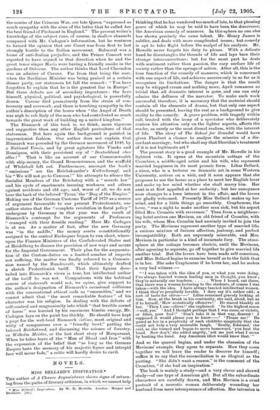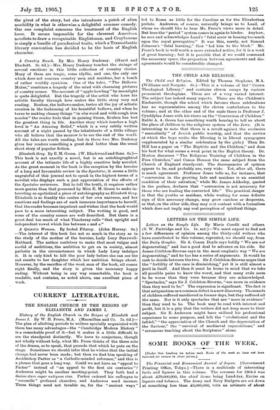* Hiss Bellard's Inspiration. By W. D. Howells. London: Harper
and Brothers. [Us.)
the American comedy of manners. In this sphere no one else has shown precisely the same talent. Mr. Henry James is subtler, and deals with more complicated issues; but comedy is apt to take flight before the scalpel of his analysis. Mr.
Howells never forgets his duty to please. With a delicate hand he disentangles the threads of life and lays bare their strange interconnections; but for the most part he deals with sentiment rather than passion, the easy surface life of society rather than the springs of action. After all, this is the true function of the comedy of manners, which is concerned with one aspect of life, and achieves success only in so far as it recognises its limitations. The danger is that the result may be whipped cream and nothing more, April romances so trivial that all dramatic interest is gone, and one can only admire the deftness of the narrator. To make such work successful, therefore, it is necessary that the material should contain all the elements of drama, but that only one aspect
should be presented, leaving the rest as a background to give. reality to the comedy. A grave problem, with tragedy within call, treated with the irony of a spectator who deliberately centres his attention only on the lighter aspects, affects the reader, as surely as the most dismal realism, with the interest of life. The story of The School for Scandal would have
given Flaubert a chance to analyse the miseries of a dis- cordant marriage ; but who shall say that Sheridan's treatment of it is not legitimate art ?
The present story is a good example of Mr. Howells in his lightest vein. It opens at the mountain cottage of the Crombies, a middle-aged artist and his wife, who represent married happiness in its most prosaic form. Lilies Bellard, a niece, who is a lecturer on dramatic art in some Western University, arrives on a visit, and it soon appears that she proposes to use the house as a place to meet her English lover and make up her mind whether she shall marry him. Her aunt is at first appalled at her audacity ; but her annoyance soon changes to a keen interest in the affair, and the lovers are gladly welcomed. Presently Miss Bellard makes up her mind, and for a little things go smoothly. Craybourne, the lover, " was a sight to make another man sick, but his aspect filled Mrs. Crombie with reverence." Then from a neighbour- ing hotel arrives one Mevison, an old friend of Crombie, with his wife, whom Mrs. Crombie had unwisely invited to join the party. The Mevisons represent another type of married life, a curious mixture of furious affection, jealousy, and perfect incompatibility. Both are supremely miserable, and Mrs.
Mevison in particular is a kind of incarnate fury. The atmo- sphere at the cottage becomes electric, until the Mevisons, after agreeing to separate, go off together to give married life another trial. But the lovers have been made self-conscious, ' and Miss Bellard begins to examine herself as to the faith that is in her. She asks Craybourne if he loves her, and he makes • a very bad witness :—
" I was taken with the idea of you, or what you were doing. I've always fancied women leading men in thought, you know ; they're naturally our teachers When I heard, out there, that there was a woman lecturing to the students, of course I was taken—with the idea. I have always fancied intellectual women. I think they're peculiarly lovable. I dare say it's rather odd; a sort of taste for olives—' Lilias remained gravely looking at him. Now, at the break in his continuity, she said, aloud, but as if to herself, 'How ecstatically offensive !' He stared blankly at her. Then I am—olives !' she explained. In the highest sense
yes.' And I thought perhaps that I was roses, or violets, or lilies, poor fool !" Don't take it in that way, dearest ! I supposed it would please you to know—' Please me !' He gazed at her in a perplexity of such childlike simplicity that she could not help a very miserable laugh. 'Really, Edmund,' she said, as she turned and began to move homeward, you beat the band. Now don't,' she added angrily, ask me just what I mean by beating the band. Any American idiot would know that."'
And so the quarrel begins, and under the obsession of the Mevisons' example, they agree to separate. How they come together we will leave the reader to discover for himself ; suffice it to say that the reconciliation is as illogical as the parting. " She didn't want a reason," is the comment of the Crombies, " if she had an inspiration."
The book is mainly a study—and a very clever and shrewd study—of one type of American girl. But all the subordinate characters are carefully drawn, and Mrs. Mevison is a cruel portrait of a neurotic woman deliberately wounding her husband from mere intemperance of affection. Her intrusion is
the pivot of the story, but she introduces a patch of alien morbidity in what is otherwise a delightful summer comedy. Our. one complaint concerns the treatment of the English lover. It seems impossible for the cleverest American novelists to draw a recognisable Englishman, and Craybourne is simply a bundle of paradoxical traits, which a Transatlantic literary convention has decided to be the basis of English character.
A Country Bunch. By Mrs. Henry Dudeney. (Hurst and Blackett. 3s. 6d.)—Mrs. Henry Dudeney touches the strings of several emotions in this little collection of country stories. Many of them are tragic, some idyllic, and one, the only one which does not concern country men and maidens, has a touch of rather worldly cynicism. One of the tales, "The Bellows- Maker," combines a tragedy of the mind with charming pictures of country scenes. The account of "apple howling " by moonlight is quite delightful. But the tragedy of the artist who loses his artistic faculty through love makes the little story very sad reading. Reuben, the bellows-maker, tastes all the joy of artistic creation in the fashioning of his beautiful bellows, and when he turns to making clumsy things "in elm wood and with rough iron nozzles" the reader feels that in gaining Susan, Reuben has lost the greatest thing in life. Another story which touches a high level is " An Amazing Belief," which is a very subtly written account of a night passed by the inhabitants of a little village who all believe that the morrow is to see the end of the world. All the tales are worth reading, but in these two Mrs. Dudeney gives her readers something a great deal better than the usual short story of popular fiction.
Elizabeth Grey. By E. M. Green. (W. Blackwood and Sons. 6s.)— This book is not exactly a novel, but is an autobiographical account of the intimate life of a highly sensitive lady novelist. As the great moment in the book is the reception by the heroine of a long and favourable review in the Spectator, it seems a little ungrateful of this journal not to speak in the highest terms of a novelist who displays such a just appreciation of the efforts of the Spectator reviewers. But to tell the truth, it requires rather more genius than that possessed by Miss E. M. Green to make in- teresting so egotistical a piece of autobiography as Elizabeth Grey. Elizabeth is so frankly the centre of her own universe, and her emotions and feelings are of such immense importance to herself, that the reader becomes impatient and wishes that the book would pass to a more interesting subject. The writing is good, and some of the country scenes are well described. But there is a great deal too much of what. Thackeray calls "that upright and independent vowel which lies between e and o."
A Quixotic Woman. By Isobel Fitzroy. (John Murray. 6s.) —The interest of this book lies not so much in the story, as in the study of the mother of the heroine, Lady Lucy Buz zwell- Hubbard. The author contrives to make that most vulgar and sordid of ambitions, the ambition to get on in society, almost pathetio in the circumstances in which Lady Lucy indulges it. It is only kind to kill the poor lady before she can see the sad results to her daughter which her ambition brings about. However, by the sacrifice of the weak man of the book, all comes right finally, and the story is given the necessary happy ending. Without being in any way remarkable, the book is readable, and contains, as noted above, one excellent piece of work.



































 Previous page
Previous page